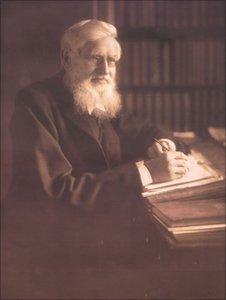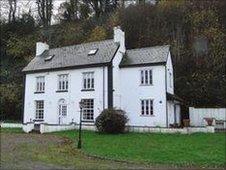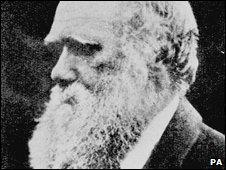Bid to preserve Alfred Russel Wallace's birthplace
- Published

Alfred Russel Wallace developed similar theories to Charles Darwin
Campaigners say they have had a disappointing response to efforts to protect the Monmouthshire birthplace of a pioneering Welsh scientist.
The former Usk home of Alfred Russel Wallace, who developed the theory of evolution alongside Charles Darwin, is for sale for £355,000.
There have been calls for it to be listed or made into a museum.
Heritage body Cadw has considered listing the property, but said it had been "substantially altered".
Dr George Beccaloni, curator of insects at the Natural History Museum and chair of the Alfred Russel Wallace Memorial Fund, fears developers could make more drastic alterations to Kensington House or even demolish it.
He said: "It seems a shame when there are so many properties that are grade I or II listed, they [Cadw] don't think that the birthplace of one of the greatest people ever born in Wales should be protected."
Dr Beccaloni said Wallace was born at the house and lived there until he was five or six years old.
"The cottage was very important to Wallace," he said.
"He visited it at least twice in later life and wrote in his autobiography how important his early part of his life was in forming his views.
"At least two of his sisters are buried in the local churchyard which is a stone's throw from the house."

Wallace's birthplace near Usk is for sale for £355,000
Cadw said it had twice considered listing Wallace's birthplace - once in 2000 as part of a survey of listed buildings in the area and again this year following a request.
A Cadw spokesperson said: "Though Wallace's importance in the development of the theory of evolution is now fully recognised, it was decided not to list Kensington House as it has been substantially altered and now retains little of its original early 19th Century character and contains no features that directly illustrate its historical associations with Wallace who lived there for the first five years of life.
"Wallace's contribution to Welsh life is, however, recognised in the listing of the Mechanic's Institute in Neath, which he designed in the 1840s."
Wallace, who lived in Neath on a couple of occasions, was a leading thinker on evolution in the 19th century, although his work was overshadowed by Darwin.
Darwin said evolution occurred by natural selection where the "fittest" animals or plants were more likely to survive and reproduce.
Wallace had been working on similar theories but it was Darwin's most celebrated work, On the Origin of Species, which captured the public imagination.
However, Wallace was given the Order of Merit, the highest honour that could be given by the British monarch to a civilian.
Poet Anne Cluysenaar, who has wrtten a book of poems inspired by Wallace, would like to see his birthplace bought and used for educational purposes.

Charles Darwin published On the Origin of Species in 1859
She said: "He was born here after all, and there doesn't seem to be the sort of interest there should be.
"He is a major figure. I didn't realise that until I went to the Natural History Museum for the first time.
"In America, there is much more interest in him. Two of the most recent books on him have been published in America."
The National Trust said it had to prioritise its resources and was not considering buying the house.
"The National Trust has a rigorous process with which to assess any potential acquisition," it said.
"This involves looking at the historical significance, whilst also the need for a financial endowment with all acquisitions.
"Therefore the National Trust often has to make hard decisions and prioritise its limited resources.
"At this time this house is not presently being considered as a potential acquisition."
The house is on the market for £355,000, although it was originally priced at £525,000.
Estate agent Helen Malnati, of Roberts & Co in Caerleon near Newport, said: "There's lots of interest but not so much because of the history aspect but more because people think it's a bargain now."